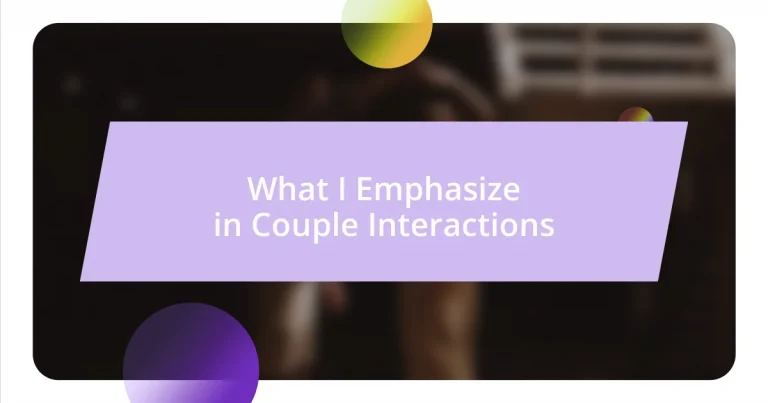Key takeaways:
- Effective communication, including active listening and clarity, is crucial for building intimacy and preventing misunderstandings in relationships.
- Establishing trust requires consistent reliability, open sharing, respect for boundaries, and accountability; small daily practices strengthen this bond.
- Creating shared goals fosters teamwork and deeper connections, illustrating shared values and encouraging adaptability in partnership dynamics.
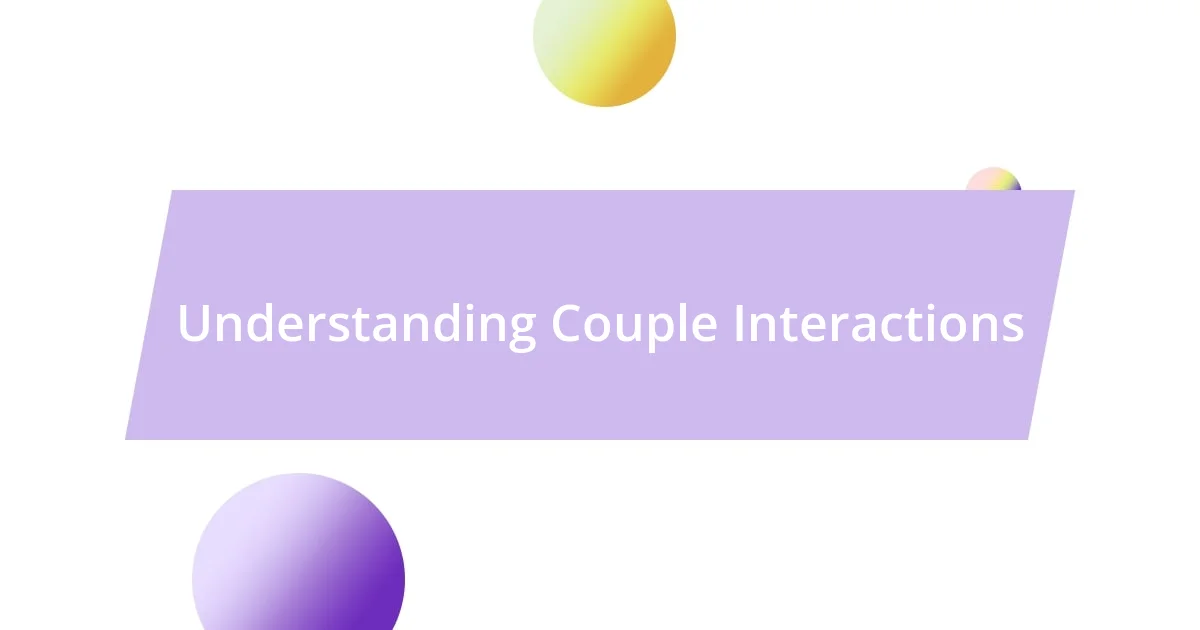
Understanding Couple Interactions
Understanding how couples interact is like peeling back the layers of an onion—each layer reveals something new. I’ve often noticed that small, seemingly trivial moments can create the most profound connections. For instance, a simple shared laugh over a shared joke can transform tension into ease, heightening emotional intimacy.
In my experience, effective communication is the backbone of any healthy relationship. I remember a time when my partner and I faced a misunderstanding that could have spiraled out of control. Instead, we took a step back and chose to talk it out. Does that resonate with you? I believe that choosing to openly express feelings can clear the air in ways that few other actions can.
Moreover, the rhythm of daily interactions profoundly shapes the dynamics of a partnership. I find that the little acts—like a smile in passing or a hand squeeze during a movie—create a foundation of affection that nurtures love over time. Have you ever considered how such simple gestures might fortify your own relationship? It’s these subtle elements that, in my opinion, form the bedrock of trust and connection between partners.
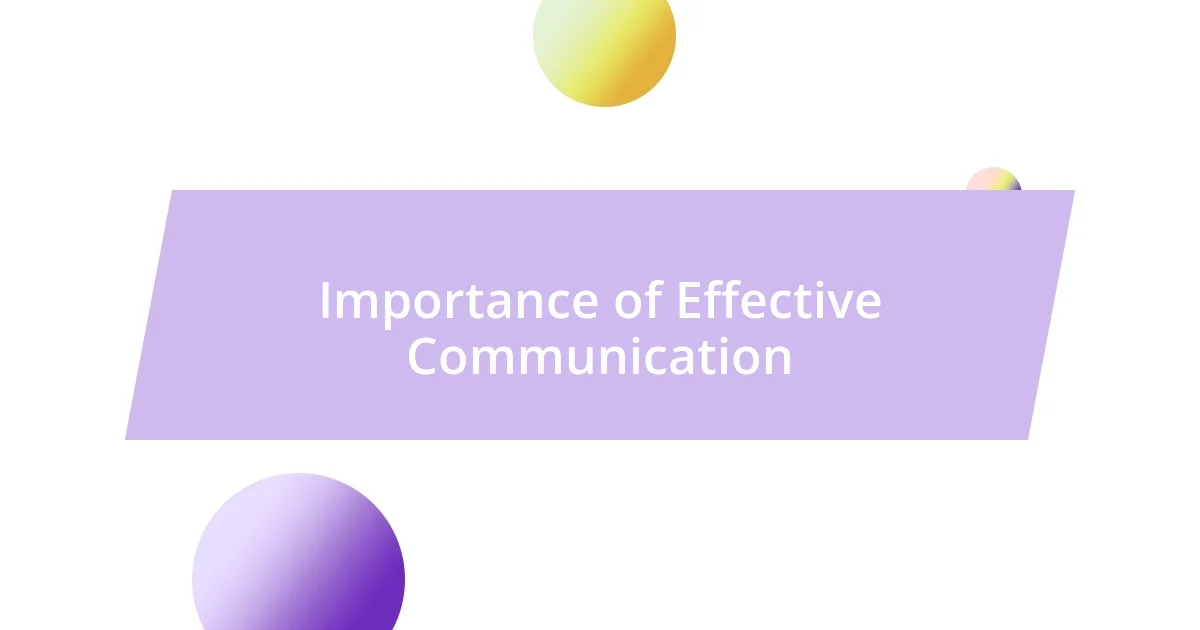
Importance of Effective Communication
Effective communication can make or break a relationship. I’ve seen couples struggle not because they don’t care for each other, but because they fail to articulate their needs. I remember a friend who often bottled up her feelings. When she finally expressed her frustrations, it was like a dam breaking; the relief was palpable, and it brought her and her partner closer together. Have you ever felt that weight lift after discussing something you’ve kept inside?
In my experience, active listening is just as vital as speaking freely. I once attended a relationship workshop where they emphasized the importance of truly hearing your partner’s words. It was enlightening to realize how often we respond without fully absorbing what the other person is saying. Reflecting on my relationships, I’ve found that moments of silence filled with understanding can often speak louder than words.
Also, clarity in communication prevents misunderstandings. For instance, a simple “You make me happy” can be more powerful than a lengthy discussion filled with vague statements. When my partner shares what I do that lifts their spirits, it not only validates me but also encourages me to keep nurturing that dynamic. How does clarity shape your discussions with your partner?
| Effective Communication | Consequences of Poor Communication |
|---|---|
| Builds trust and intimacy | Creates misunderstanding and distance |
| Encourages openness and vulnerability | Leads to resentment and frustration |
| Facilitates problem-solving | Results in unresolved conflicts |
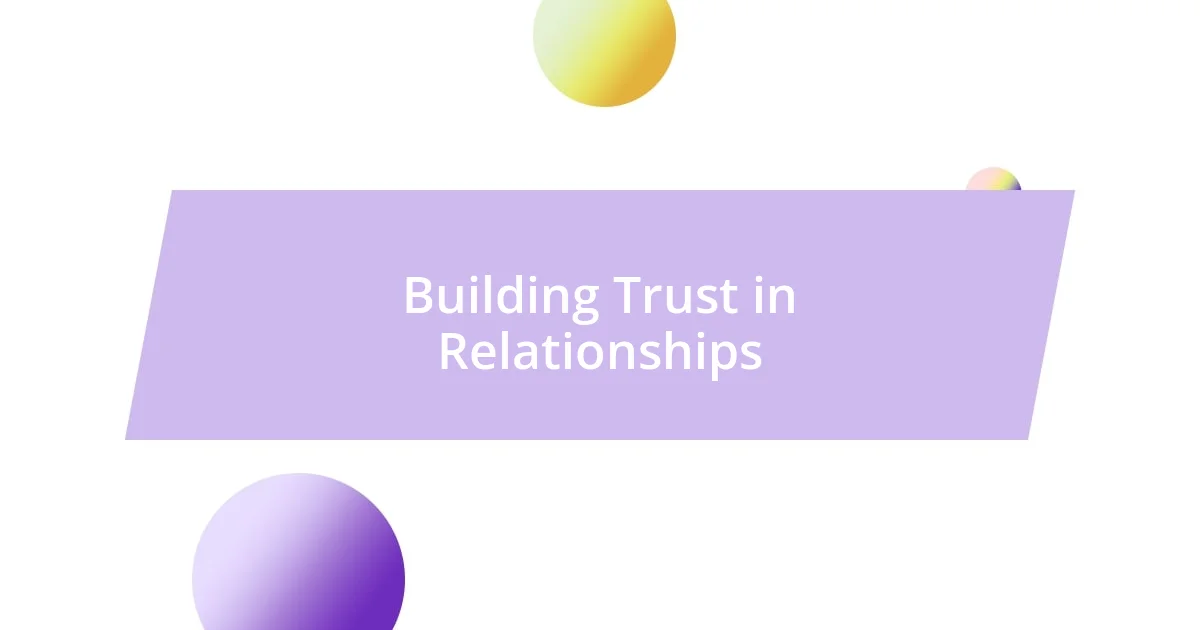
Building Trust in Relationships
Building trust takes time and intention. I remember a moment that truly solidified my trust in my partner—when she entrusted me with a personal secret. Sharing vulnerabilities like this establishes a deeper level of connection. It’s amazing how such acts can dissolve barriers and create a safe space for both individuals to be their authentic selves.
Here are some fundamental practices for building trust in a relationship:
- Consistent Reliability: Show up for your partner as promised, whether it’s attending events or simply being present for a conversation.
- Open Sharing: Discuss your thoughts and feelings openly; this cultivates transparency.
- Respect Boundaries: Acknowledge and honor each other’s limits. It demonstrates respect and fosters trust.
- Accountability: Own up to mistakes when they happen. Just saying “I’m sorry” can go a long way.
- Quality Time: Make time for each other. It signals to your partner that they are valued and important.
In my view, building trust is as much about the everyday choices we make as it is about grand gestures. I often think about the times my partner and I have shared our hopes and fears over late-night talks. Those moments feel so intimate and reaffirming, anchoring our commitment to each other. By consistently choosing to be vulnerable, we create a strong partnership where trust isn’t just built—it’s nurtured every day.
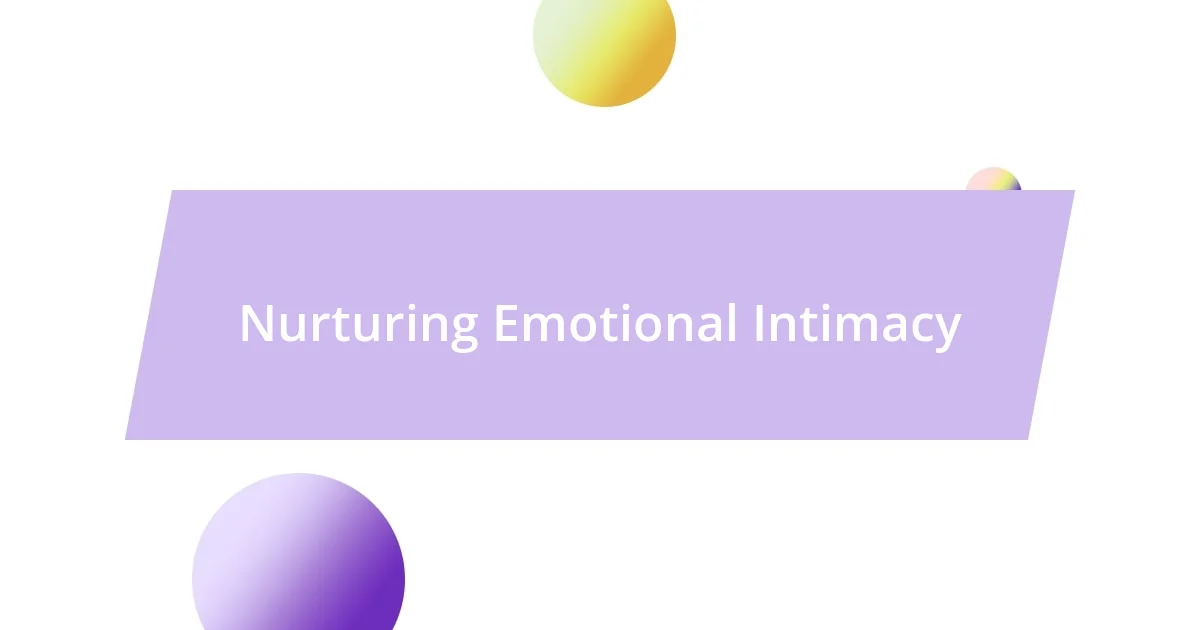
Nurturing Emotional Intimacy
Nurturing emotional intimacy is an ongoing journey that requires intentional effort. I recall a time when my partner and I scheduled “check-in” nights, where we set aside distractions to sit and share our feelings openly. It was during one of those evenings that I realized how much I had been holding back; expressing my vulnerabilities allowed us to connect on a level that felt profound and refreshing. Have you ever tried setting aside time specifically to delve into emotional discussions?
Another key aspect for me has been the power of physical affection in nurturing intimacy. I remember a particularly difficult week when a simple embrace from my partner shifted my entire mood. It wasn’t just about comfort; it was about feeling seen and understood without any words. I believe these small gestures can pave the way for deeper emotional conversations and reinforce the bond that keeps us strong.
Emotional intimacy often grows from shared experiences, too. I cherish the times my partner and I have explored new hobbies together, such as cooking or hiking. Each shared adventure builds memories and stories that weave our lives together, further solidifying our connection. It makes me wonder—what experiences have enriched your own emotional ties with your partner recently?
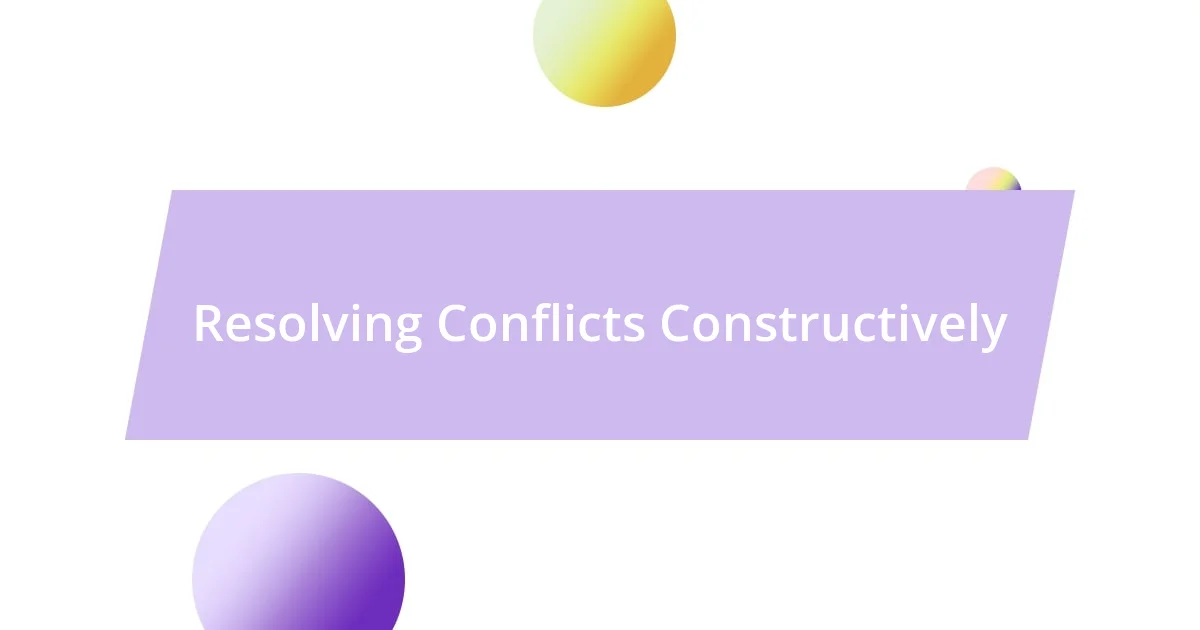
Resolving Conflicts Constructively
Balancing conflict resolution with empathy is crucial. I remember a heated disagreement with my partner about household responsibilities. Instead of letting frustration escalate, we took a break, and I reflected on her perspective. When we reconvened, I approached the conversation with a sense of curiosity rather than defensiveness. It made all the difference. Have you ever noticed how shifting your mindset can change the dynamics of a disagreement?
Listening actively holds immense power in resolving conflicts constructively. During a disagreement, I once made a conscious effort to repeat back what I understood my partner felt. This simple act of validation not only calmed the situation but also allowed her to express herself more fully, leading to a resolution that felt satisfying for both of us. I find that when emotions run high, showing that you’re genuinely listening can create an atmosphere where both parties feel heard and appreciated.
Another essential practice I’ve adopted is to focus on the specific issue at hand, avoiding discussions that stray into personal attacks. For instance, during a past argument, I made a point to express my feelings about a particular action rather than generalizing about my partner’s behavior. This approach transformed our conflict from a battle of egos into a collaborative problem-solving session. What strategies do you find helpful in keeping the conversation constructive during tough times?

Enhancing Mutual Support
Enhancing mutual support is all about being there for one another, even in the smallest ways. I recall a moment when my partner had a long day at work. I surprised her with her favorite tea and a cozy blanket. That simple gesture not only lifted her spirits but also reinforced the trust that we’re in this together, no matter what life throws our way. Have you ever thought about how little acts of kindness can have a huge impact on your partner’s day?
Creating an environment where both partners feel safe to express their needs is essential for fostering mutual support. I’ve learned to vocalize when I need help or simply some alone time, instead of letting resentment build quietly. It’s amazing how often my partner is eager to step in and support me, once she knows what I need. Have you tried sharing your needs openly, and how did it go for you?
One key practice I treasure is acknowledging each other’s achievements, no matter how small. I remember celebrating my partner’s completion of a challenging project with a spontaneous dinner date. It wasn’t just about the celebration; it was about reinforcing the idea that we are cheering for each other’s victories. This mutual encouragement creates a positive feedback loop, strengthening our bond over time. What ways do you show support for your partner’s successes?

Creating Shared Goals Together
Creating shared goals together is a fantastic way to cultivate partnership and harmony. I vividly recall a weekend when my partner and I sat down with a cup of coffee to discuss our dreams. We didn’t just list them; we crafted a vision board that captured both our individual ambitions and our mutual aspirations. That tangible representation not only made our goals feel more real, but it also sparked conversations about how we could support each other along the journey. Have you ever tried visualizing your goals together in a creative way?
It’s interesting how discussing shared goals can reveal so much about each other’s values and priorities. For example, during one of our discussions, I realized my partner is really passionate about sustainability. This newfound understanding inspired us to set a goal to reduce our carbon footprint together by adopting new habits like composting and carpooling. Little did we know, it became an exciting project that fostered deeper connections and teamwork in our daily lives.
Another approach I find valuable is to regularly revisit and refine those shared goals. I remember a time when we evaluated our progress on a fitness routine we had set together. We found that, while we loved the challenge, our schedules didn’t align as we had hoped. Instead of feeling defeated, we adjusted our goal to include both our realities, ultimately creating an even more inclusive plan. It made me reflect on how flexibility in goal-setting can actually strengthen our partnership. How often do you check in on your shared goals to ensure they still resonate with both of you?












